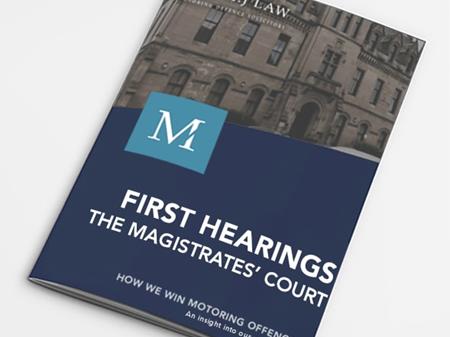Failing to Provide A Specimen Solicitors
Failing to provide a specimen is a serious criminal offence. You should seek immediate legal advice and consider all available defences. If you would like to discuss your case, please call our office for free initial advice.
We can help you with:
- Discussing your options
- Reviewing the evidence
- Identifying defences
- Next steps


Charged with Failing to Provide a Specimen?
We can help.
M.A.J. Law are the nation’s leading motoring defence solicitors. Our team are experts in challenging evidence and avoiding convictions. M.A.J. Law has a proven track record of successfully defending failing to provide cases.
Failing to provide a specimen is not the same offence as drink or drug driving. In fact, a sober person who has not been driving can be convicted of this offence, as unfair as it sounds. Any person charged with failing to provide should attend the first hearing with an open mind.
Charged with failing to provide following a drug driving investigation?
If you've been charged with failing to provide a sample of blood having been suspected of drug driving - Click Here.
Did the police pull you over?
The police have a general power to stop any vehicle on the road under Section 163 RTA 1988. However, they do not have the power to conduct random roadside tests. To do this they must have reasonable cause (i.e. a suspicion or belief) that a drink or drug driving offence may have been committed. An officer will have reasonable cause if:
- The motorist commits a moving traffic offence (jumping a red light, driving erratically, etc)
- The motorist is involved in a road traffic collision
- The motorist is displaying signs of intoxication/impairment (glazed eyes, slurred speech, etc)
- The officer can smell or see alcohol or drugs
- The motorist admins to having consumed alcohol or drugs
If the roadside officer has 'reasonable cause', he may ask you to give a preliminary specimen (breath test or saliva test), or he may arrest you immediately under Section 4 of the Road Traffic Act 1988 (for driving whilst unfit). The purpose of the arrest is to obtain a more accurate specimen from you at the police station.
Many police forces hold random stop checks (sometimes referred to as a 'document check'). If the circumstances of the stop would not give the officer reasonable cause to suspect or believe that alcohol or some drug had been consumed, this may render your arrest unlawful. It’s also worth noting that the officer making the requirement for you to provide a roadside test must be in full police uniform.
If we can find fault with any part of the police procedure, it is likely the case against you would fail. This means you avoid a disqualification and a criminal conviction.
Police Charges
If you have been charged with failing to provide a specimen you will now be facing the prospect of attending court. No doubt you will be extremely worried about the court hearing and what will happen to you. You may be thinking of pleading guilty or you may be wondering if there is any possibility of defending the charge. Either way it is vital that you obtain professional advice and consider all your options.
Failing to Provide - Vehicle Driver: Penalties
The penalty for a failing to provide allegation can range from 10 points on your licence to a prison sentence, depending on the circumstances of the offence and the impairment level of the individual. If convicted, it can often mean:
- Loss of licence for a minimum of 12 months
- Increased insurance premiums
- Branded a ‘High Risk Offender’
- Loss of job
- A criminal record
- A DVLA medical before your licence is returned
- VISA and possible travel restrictions
- Attendance on the Drink Drive Rehabilitation Course
- Possible custodial sentence
Remember that pleading guilty is not your only option. In fact, there could be a number of options available to you, depending on the exact circumstances of your case. Please see the table below for the sentencing guidelines used by the Magistrates Court for the offence of failing to provide a specimen.
Failing to provide sentencing guidelines
| Nature of activity | Starting point | Range | Disqualification |
|---|---|---|---|
| Honestly held but unreasonable excuse | Band C fine | Band C fine | 12 – 16 months |
| Deliberate refusal/failure | Community Service | Fine to Community Service | 17 - 28 months |
| Deliberate refusal and evidence of serious impairment | 12 Weeks in prison | Community Service to Prison | 29 - 36 months |
Failing to Provide - Vehicle Driver: Penalties
Failing to provide having been 'in charge' of a vehicle is less serious than if you are accused of driving. The Charge Sheet given to you by the police will tell which type of offence you have been charged with. This is very important because the two offences carry different penalties, they may also be defended in a different way. It is also important to know that an 'in charge' offence will not trigger the minimum three-year disqualification if you have a previous drink, drug or FTP conviction within the last 10 years. Only a 'driving' offence will count.
Sentencing Guidelines
| Nature of activity | Starting point | Penalty |
|---|---|---|
| Honestly held but unreasonable excuse | Band B fine | 10 points |
| Deliberate refusal/failure | Band C fine | 10 points or ban |
| Deliberate refusal and evidence of serious impairment | Community Service | Community Service to Prison and ban |
If you accrue 12 or more penalty points on your licence within a three-year period you will be subject to a 6 month driving disqualification under the 'totting up' provisions. Once the period of disqualification has ended, your licence will be clean. You may be able to avoid a 6 month driving ban by arguing 'exceptional hardship'. You can read more about exceptional hardship here.
Failing to provide FAQ's
Can I go to prison for failing to provide a sample?
Yes. In fact, it's more likely that you would go to prison for failing to provide than it is for drink or drug driving. Failing to provide a specimen is one of the most serious driving offences that a motorist can commit. It is often considered far more serious than drink or drug driving because the court will assume that you were heavily intoxicated (and that is the reason why you failed to provide). To go to prison, the court must be satisfied that there is evidence of serious impairment and a deliberate refusal to provide a specimen. In order to prove that you were seriously impaired, the police will need evidence of the following;
- Your eyes were glazed
- Your speech was slurred
- You smelt of alcohol
- You were unsteady on your feet
Take a look at the witness statement below. This statement was provided by a police officer in a fail to provide case.

In almost all cases the police will claim that the suspect was impaired. This is why it is important to review CCTV and/or Body Worn Video. It's amazing how often the video footage shows a suspect speaking clearly and walking normally!
Please remember that in a fail to provide case the court could decide that you deliberately refused even where you made attempts to blow. If you did make an attempt to blow, think about the Mouthpiece Defence.
Can I get off a failing to provide charge?
In some circumstances, yes. There are a number of defences that apply to the offence of failing to provide. For example;
- if you had a 'reasonable excuse' for not providing you should not be convicted,
- if there was a technical or procedural error of some kind
- if the breath machine was faulty or malfunctioned
- if the mouthpiece was blocked
- if a witness fails to attend court
We can usually tell you within the first 5 minutes whether you have a defence to the allegation. Feel free to call us on 01514228020. We do not charge you for initial advice.
How much does a failing to provide solicitor cost?
A specialist solicitor may not cost as much as you think. M.A.J Law work on a fixed fee basis, meaning costs will not increase even if the case becomes more complicated. All our fees fall in stages so you're not overcharged for the work required. If your case doesn't reach a trial, you don't pay for it. This is the fairest and most cost-effective way of structuring legal costs.
M.A.J Law employs a cost draftsman to recover money back from the government following the successful defence of a case. This means that you receive some money back paid to solicitors in legal fees.
You can read more about our pricing structure here.
How long will I be banned for?
You are only banned if you are convicted of failing to provide. You will not be banned if you win your case. To learn more about how to win your case, call us for free advice on 01514228020.
The length of your driving ban depends upon your behaviour at the police station. If the police claim that you were seriously impaired and deliberately refused to give a sample, the ban is usually 29 months (longer if you have a previous conviction). You can also go to prison for 12 weeks. Good mitigation may help to reduce your ban.
Failing to Provide Solicitor Reviews
What our clients say...
NEXT STEPS: Free Legal Advice from M.A.J Law
M.A.J Law are a specialist team driving defence solicitors. We believe that every motorists has the right to independent legal advice. For that reason, we offer every motorist free specialist initial advice no matter what your circumstances.





